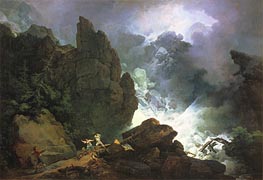
Philip James de Loutherbourg Painting Reproductions 1 of 1
1740-1812
French Romanticism Painter
Philip James de Loutherbourg was an 18th-century French-German painter, printmaker, and inventor who worked primarily in England. He was born on October 31, 1740, in Strasbourg, France, and later became a naturalized British citizen.
De Loutherbourg's talent was recognized at an early age, and he studied under the French painter, Joseph-Marie Vien, before becoming a student at the Royal Academy in Paris. In 1771, he moved to London, where he became a member of the Royal Academy and began to establish himself as one of the leading artists of the day.
De Loutherbourg was renowned for his landscapes, but he also excelled in other genres, including portraiture and history painting. He was particularly interested in capturing the effects of light, and his work was often characterized by his use of luminous, atmospheric effects. He was also known for his innovative use of color and his ability to convey the moods and emotions of his subjects.
In addition to his work as a painter, de Loutherbourg was also an accomplished inventor and engineer. He designed several innovative stage sets and special effects for the theater, and was instrumental in the development of the "Eidophusikon," an early form of moving picture show that used light, sound, and motion to create a lifelike representation of various scenes.
De Loutherbourg died on March 11, 1812, in Chiswick, England. Despite his reputation as a highly talented and innovative artist, he is sometimes overlooked in the history of art and is not as well-known as many of his contemporary artists. Nevertheless, his work continues to be appreciated by art lovers and his influence can still be seen in the works of later artists.
De Loutherbourg's talent was recognized at an early age, and he studied under the French painter, Joseph-Marie Vien, before becoming a student at the Royal Academy in Paris. In 1771, he moved to London, where he became a member of the Royal Academy and began to establish himself as one of the leading artists of the day.
De Loutherbourg was renowned for his landscapes, but he also excelled in other genres, including portraiture and history painting. He was particularly interested in capturing the effects of light, and his work was often characterized by his use of luminous, atmospheric effects. He was also known for his innovative use of color and his ability to convey the moods and emotions of his subjects.
In addition to his work as a painter, de Loutherbourg was also an accomplished inventor and engineer. He designed several innovative stage sets and special effects for the theater, and was instrumental in the development of the "Eidophusikon," an early form of moving picture show that used light, sound, and motion to create a lifelike representation of various scenes.
De Loutherbourg died on March 11, 1812, in Chiswick, England. Despite his reputation as a highly talented and innovative artist, he is sometimes overlooked in the history of art and is not as well-known as many of his contemporary artists. Nevertheless, his work continues to be appreciated by art lovers and his influence can still be seen in the works of later artists.
1 Philip James de Loutherbourg Paintings

An Avalanche in the Alps 1803
Oil Painting
$1655
$1655
Canvas Print
$52.37
$52.37
SKU: LPJ-16635
Philip James de Loutherbourg
Original Size: 110 x 160 cm
Tate Gallery, London, United Kingdom
Philip James de Loutherbourg
Original Size: 110 x 160 cm
Tate Gallery, London, United Kingdom